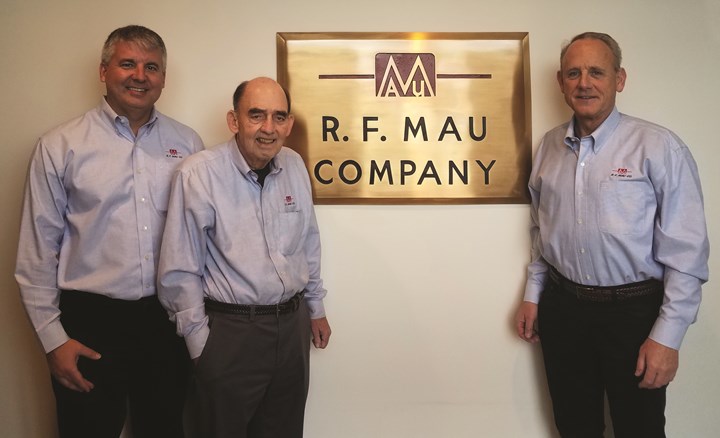R.F. Mau Uses Conservative Approach to Grow
Brian Adams, fourth-generation president of R.F. Mau, and vice president/general manager, Tony Gemignani, discuss the past, present and future of the company.
PMPA: What’s a brief history of R.F. Mau?
Brian Adams: R.F. Mau was my maternal great-grandfather. He started the company in 1936 on W. Lake St. in the downtown Chicago Loop area. He bought, sold and manufactured parts for the automotive and industrial equipment industries. He and my grandfather, John Mau, moved the company to a newly developing industrial area in Skokie in/about 1947. Mau Co. was a Brown & Sharpe house until 1959 when John Mau bought the company’s first multiple spindle screw machine, a rebuilt S&M New Britain Model 61. Growing up around the shop through the 1950s and early ‘60s, Bruce Mau came with the company on a full-time basis in 1965. Under his leadership, Mau Co. experienced tremendous growth.
PMPA: What is your history with R.F. Mau?
BA: I started working part time, summers in 1980 while still in college, and came to work full time for Bruce Mau, my uncle, in the spring of 1983. I worked on New Britain multis, learning the trade from the ground up. By 1985, Bruce began teaching me administrative basics about running a screw machine shop, and I became general manager the following year. In 2009, I became Mau Co.’s fourth-generation president. It’s been quite a ride! If I had one wish, it would be that my grandfather could have seen me in the business. I like to think he’d be proud of what we’ve accomplished as a team.
Tony Gemignani: In the summer of 1997, I was on vacation with my family at Bruce and Linda Mau’s Iowa farm and shortly thereafter, he brought me on as production manager. In 2009, I became the vice president/general manager.
PMPA: What is R.F. Mau’s niche?
BA: Our core competency continues to be brass and aluminum screw machine components.
TG: 100% non-ferrous, which differentiates us from most other shops.

(Left to right) Tony Gemignani, Bruce Mau and Brian Adams.
PMPA: Is there an overall vision?
BA: We continue to expand the business, moving away from strictly multi-spindle screw machines into CNC Swiss and rotary transfer production machines. Recently, we purchased our third building in the area, adding 31,000 square feet to the overall Mau Co. footprint. The new building will house the CNC Swiss operation, along with finished goods inventory, parts washing and office space.
TG: We envision rearranging our product flow using the new building. So, there will be some changes to the existing flow to help us be even more efficient.
BA: We half-joke that we were lean before it was cool to be lean! Our leadership team is small by most standards, as profits are the result of continued shopfloor investment. Our resources are focused primarily on our people and processes.
PMPA: What business models are working well for R.F. Mau?
BA: We’re believers in steady, moderate growth over time, and operating at zero-debt. While our current business model excludes automotive parts production, we keep the door open for growth opportunities in all fields.
TG: Organic growth requires a willingness to explore all options if they fit into our long-term strategy. We’ll see.
BA: One of our long-term growth strategies involves being highly selective about new customers. Like employee candidates, we “interview” potential customers to make sure there is a synergistic fit—an alignment based on common goals and objectives. In most cases, we become the primary screw machine parts source for these customers.
TG: Our fiscally conservative approach to running the business has worked well for us. There are companies that have grown much faster than us by leverage, but that comes with huge risk.
PMPA: Why do you value your PMPA membership?
TG: I think our relationship with other PMPA member companies is the best part. Access to shared information through the ListServe is very helpful, and the national meetings, in particular, has helped us develop close friendships with many of our friendly competitors. PMPA membership provides a unique opportunity to make our business stronger.
BA: Having served on the PMPA Board of Directors twice, as well as having served on several local and national committees, I can honestly say the exchange of information—the networking—has been indispensable to helping improve our business. Echoing Tony, the national meetings provide a wonderful vehicle for this exchange of ideas and information.
Related Content
Machining Unleaded Materials — Reliability is Possible
Leaded steel is no longer produced in the United States. How do shops approach unleaded brass and steel machining?
Read MoreCold-Drawn Steel Barstock: How It Is Manufactured, Benefits to Your Shop
Understanding the benefits provided by cold-drawn steel barstock can help you optimize the work you quote by maximizing benefits to your manufacturing process and customer.
Read MorePrecision Ground Barstock: How It Is Manufactured, Benefits to Your Shop
Understanding the benefits provided by precision centerless ground barstock can help you avoid false economy and optimize the work you quote by maximizing benefits to your manufacturing process and customer.
Read MoreTurned and Polished Steel Barstock: How It Is Manufactured, How It Impacts Your Shop
Understanding the benefits provided by turned and polished steel barstock and its differences from cold-drawn steel barstock can help you and your team avoid unexpected performance issues.
Read MoreRead Next
Do You Have Single Points of Failure?
Plans need to be in place before a catastrophic event occurs.
Read More5 Aspects of PMTS I Appreciate
The three-day edition of the 2025 Precision Machining Technology Show kicks off at the start of April. I’ll be there, and here are some reasons why.
Read MoreA Tooling Workshop Worth a Visit
Marubeni Citizen-Cincom’s tooling and accessory workshop offers a chance to learn more about ancillary devices that can boost machining efficiency and capability.
Read More




















